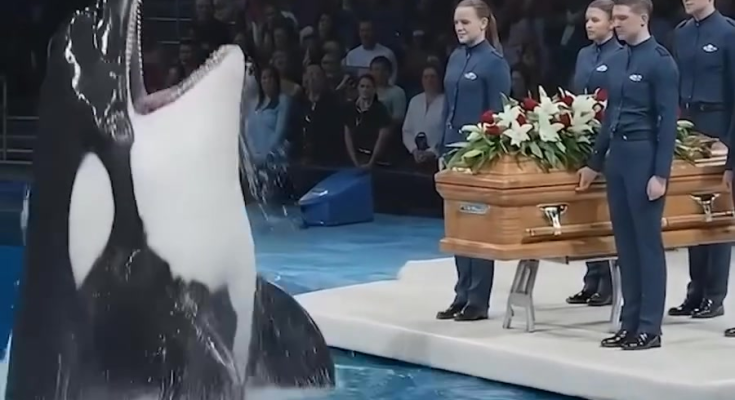A Moment of Recognition
The room was hushed, a solemn quiet that seemed to hold its breath. Kai, the massive orca, lingered near the edge of the pool, his dark eyes fixed on the casket resting nearby. His head moved gently up and down, a subtle, almost hesitant motion, as if he were waiting for someone to appear. Jessica, his lifelong companion, would not rise from that casket. The air, heavy with anticipation and sorrow, seemed to press upon everyone present—trainers, staff, and visitors alike—reminding them of the depth of emotion these majestic creatures could experience. In that moment, Kai’s gaze conveyed a feeling no words could capture: recognition, grief, and perhaps a longing for a presence now gone.
A delicate flower fell from the casket, landing lightly on the water’s surface. Kai nudged it with his nose, sending ripples that shimmered across the pool. Then, as quietly as he had appeared, he submerged beneath the water, leaving only a trail of gentle waves that lingered long after his departure. Those who watched whispered among themselves. Some believed Kai understood Jessica had passed away; others thought he was simply waiting, unwilling to abandon her side even in her absence. Regardless of interpretation, everyone agreed they had witnessed something profound: love expressed in its purest, most extraordinary form.
Understanding the Depth of Human–Animal Bonds
While humans often form attachments to animals, few bonds reach the intensity or visibility of Jessica and Kai’s relationship. Scientific studies have increasingly documented the intelligence, emotional depth, and social complexity of orcas. Known for their intricate social networks in the wild, orcas demonstrate empathy, joy, grief, and remarkably nuanced communication. Observing Kai in that moment provided a living example of these capabilities.
Marine biologists often describe orcas as sentient beings with rich emotional lives, emphasizing that their relationships with humans can be profound, particularly when nurtured with years of trust and care. Jessica’s work with Kai exemplified this truth. Their bond was not rooted in dominance or mere performance; it was built on empathy, mutual respect, and finely tuned communication. She could read his subtle gestures, understand his moods, and respond in ways that reinforced trust rather than command compliance. This connection, forged over years of patience and attentiveness, culminated in the poignant display at her memorial—a moment that revealed the extraordinary awareness these animals can possess.
The Emotional Aftermath for the Community
Jessica’s passing left a void that reverberated through the community of trainers, park staff, and regular visitors. She had been more than a colleague; she was a mentor, a guiding presence, and a friend to many. Her dedication to the animals under her care influenced not only their wellbeing but also the professional standards of marine training within the park.
For children and families who had grown up watching Jessica interact with the orcas, her death was a deeply sobering moment. They realized that these animals, often perceived primarily as performers, were capable of forming bonds that transcended species. “Watching that orca react to Jessica’s casket… it changed how I see animals forever,” one visitor remarked. “They feel. They understand. They mourn. And she gave them that respect.” Such reactions reflect the subtle but powerful impact that witnessing interspecies empathy can have on human perspectives.
Training and Trust: A Lifelong Commitment
Jessica approached animal training with a philosophy that emphasized holistic understanding. She believed that every interaction should be grounded in empathy, respect, and mutual understanding. Training was not about asserting control; it was about fostering communication. Each gesture, each signal, each cue was designed to strengthen the trust between human and animal.
Kai’s behavior at the memorial serves as a testament to this lifelong approach. His recognition of Jessica’s absence was not a learned trick or a conditioned response—it was an authentic expression, cultivated over years of careful attention and mutual respect. For trainers, the lesson was clear: technical skill alone is insufficient. True understanding, patience, and compassion are equally vital in forming meaningful bonds with intelligent animals. Jessica’s methods continue to influence the next generation of marine trainers, ensuring that her commitment to empathy endures.
Witnessing grief in an orca challenges long-held assumptions about emotional expression. Humans often regard complex emotions like love, mourning, or memory as uniquely human traits. Yet, in Kai’s reaction, we see evidence that emotional depth is not restricted by species boundaries. Emotional connections, once formed through shared experiences and trust, can be profound, regardless of biology.
Jessica’s life and passing remind us that love is measured not only in words or grand gestures but in attention, understanding, and quiet moments of connection. Sometimes it is seen beneath the water’s surface, in shared routines and subtle signals. Sometimes it is witnessed in the sorrow of a creature recognizing the absence of a companion who meant the world to them. These moments compel us to reconsider how we define grief, love, and memory in both human and animal contexts.
Legacy of Compassion
Jessica’s story is a testament to the transformative power of empathy. Through her dedication, she demonstrated that when humans approach animals with respect, the relationships formed can be deeply meaningful and enduring. Her work encouraged both colleagues and visitors to see orcas not simply as performers, but as sentient beings capable of complex emotions.
Her influence extended beyond individual interactions. Jessica shaped the culture of animal care in her park, raising awareness about ethical responsibilities humans have toward animals and inspiring others to prioritize emotional wellbeing alongside physical health. Through her life and work, she left a lasting mark—not only on the animals she nurtured but also on the human hearts she touched.
The Broader Context of Human–Animal Relationships
The bond between Jessica and Kai resonates with a wider human fascination with interspecies relationships. Across history, literature, and modern science, humans have long sought connections with animals, drawn by a shared sense of companionship, loyalty, and empathy. From therapy dogs comforting those in need to elephants mourning the loss of a family member, the examples are numerous and varied.
Psychologists note that forming emotional bonds with animals can foster empathy, patience, and emotional resilience in humans. Such connections remind us of the universality of certain experiences—joy, grief, and love—which transcend species. Witnessing Kai’s grief, in particular, demonstrates that these bonds are not trivial; they can profoundly shape our understanding of emotion, memory, and care.
Grief Beyond Species
Kai’s response to Jessica’s passing challenges conventional notions of mourning. While humans often assume that grief is uniquely expressed through words, tears, or rituals, animals demonstrate sorrow in subtler ways—through changes in behavior, patterns of movement, and interactions with their environment. The gentle nudging of the floating flower, the lingering presence at the casket, and the ripples across the pool all conveyed Kai’s awareness of loss.
Observing this kind of grief can be both humbling and enlightening. It underscores that the capacity for emotional depth is not limited to humans and invites us to consider the ethical and moral responsibilities we carry toward the animals in our care.
A Lifelong Philosophy of Care
Jessica’s work exemplified a philosophy that combined emotional intelligence with practical skill. She emphasized that every act of training should strengthen trust and reinforce communication. Animals, especially intelligent species like orcas, thrive in environments where respect is mutual and care is consistent.
Her methods highlighted the importance of patience, observation, and responsiveness. Over time, this approach nurtured a unique bond with Kai—one built on understanding rather than coercion. The memorial scene offered a powerful illustration of what can happen when humans honor these principles, demonstrating that genuine relationships between species are possible when approached with sincerity and empathy.
Community and Cultural Impact
The impact of Jessica’s work extends far beyond the park itself. Visitors, especially children, often carry the lessons they learn from observing her interactions into their broader understanding of animals. They learn to respect emotional depth, recognize intelligence, and appreciate the capacity for grief, empathy, and love.
Staff and trainers, too, continue to honor her methods, integrating her philosophies into their daily routines. In this way, Jessica’s legacy is not static; it is a living, evolving influence, shaping standards of care, ethical practices, and public awareness for years to come.
Conclusion: Love That Endures
After Jessica’s memorial, the arena returned to its familiar rhythms. The laughter of children, the splashes of water, and the daily routines of trainers resumed. Yet, the memory of that day, and of Kai’s quiet gestures of recognition, lingered. The image of the orca nudging a flower and acknowledging a companion who would never return remains a lasting symbol of the extraordinary bonds that can exist between humans and animals.
Jessica’s life and work remind us that love, in its truest form, transcends words, gestures, and even species. It is measured in understanding, in trust, and in the quiet, powerful moments that define our connections. Her legacy continues in the animals she cared for, the colleagues she inspired, and the countless visitors whose perspectives were transformed by witnessing her compassion.
Kai may never forget Jessica. And perhaps, in his own way, he continues to honor the trainer who loved him unconditionally—showing that the connections we form with other beings are among the most profound legacies we leave behind.




